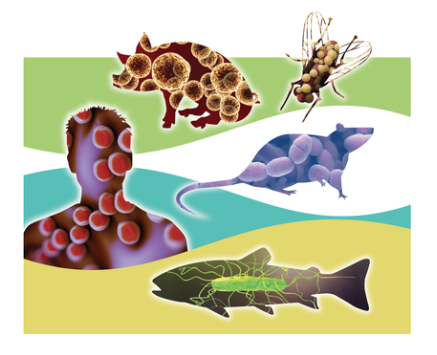 Microorganisms are continually with and around us. They reside outdoors in soil and water and coexist indoors where people live and work. They are found in and on pets, plants, and rodents; in water; in dirt tracked indoors on shoes; and in the air that enters buildings. Microorganisms also live on human skin and in systems such as the digestive tract.
Microorganisms are continually with and around us. They reside outdoors in soil and water and coexist indoors where people live and work. They are found in and on pets, plants, and rodents; in water; in dirt tracked indoors on shoes; and in the air that enters buildings. Microorganisms also live on human skin and in systems such as the digestive tract.
Recent studies have taken advantage of the development of novel tools to quantify and sequence the DNA of communities of microbes and study their functions, revealing their abundance and complexity but leaving still more questions than answers about what these communities are doing and what functions they serve in humans, animals, and our environments. These publications examine the current body of knowledge surrounding microbiomes and make recommendations for future research.
People’s desire to understand the environments in which they live is a natural one. People spend most of their time in spaces and structures designed, built, and managed by humans, and it is estimated that people in developed countries now spend 90 percent of their lives indoors. As people …
The surface of the human body and its mucous membranes are heavily colonized by microorganisms. Our understanding of the contributions that complex microbial communities make to health and disease is advancing rapidly. Most microbiome research to date has focused on the mouse as a model organism …
The Chemistry of Microbiomes: Proceedings of a Seminar Series
The 21st century has witnessed a complete revolution in the understanding and description of bacteria in eco- systems and microbial assemblages, and how they are regulated by complex interactions among microbes, hosts, and environments. The human organism is no longer considered a monolithic …
Environmental Chemicals, the Human Microbiome, and Health Risk: A Research Strategy
A great number of diverse microorganisms inhabit the human body and are collectively referred to as the human microbiome. Until recently, the role of the human microbiome in maintaining human health was not fully appreciated. Today, however, research is beginning to elucidate associations …
The Human Microbiome, Diet, and Health: Workshop Summary
The Food Forum convened a public workshop on February 22-23, 2012, to explore current and emerging knowledge of the human microbiome, its role in human health, its interaction with the diet, and the translation of new research findings into tools and products that improve the nutritional …
Microbial Ecology in States of Health and Disease: Workshop Summary
Individually and collectively, resident microbes play important roles in host health and survival. Shaping and shaped by their host environments, these microorganisms form intricate communities that are in a state of dynamic equilibrium. This ecologic and dynamic view of host-microbe …
The Science and Applications of Microbial Genomics: Workshop Summary
Over the past several decades, new scientific tools and approaches for detecting microbial species have dramatically enhanced our appreciation of the diversity and abundance of the microbiota and its dynamic interactions with the environments within which these microorganisms reside. The first …
Motivated by the explosion of molecular data on humans-particularly data associated with individual patients-and the sense that there are large, as-yet-untapped opportunities to use this data to improve health outcomes, Toward Precision Medicine explores the feasibility and need for “a …
The Social Biology of Microbial Communities: Workshop Summary
Beginning with the germ theory of disease in the 19th century and extending through most of the 20th century, microbes were believed to live their lives as solitary, unicellular, disease-causing organisms . This perception stemmed from the focus of most investigators on organisms that could be …








